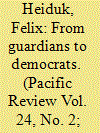|
|
|
Sort Order |
|
|
|
Items / Page
|
|
|
|
|
|
|
| Srl | Item |
| 1 |
ID:
106020


|
|
|
|
|
| Publication |
2011.
|
| Summary/Abstract |
This article explores the role the military has played in the democratization processes of three 'young democracies' (Thailand, Indonesia, the Philippines) in Southeast Asia. The issue of democratization vis-à-vis the armed forces is even more relevant for Southeast Asia as a region with historically powerful militaries and long traditions of political interventions and rampant human rights abuses. While Thailand, Indonesia and the Philippines have historically struggled with deep entrenchments of the military - not only in the political arena, but also within the bureaucracy and the economy - their respective militaries played very different roles within democratization processes. The Indonesian military remained politically neutral after the fall of Suharto, the Philippines witnessed various failed coup attempts by mid-ranking officers, while the Thai military played a key role in the termination of democracy through a coup in 2006. The dominant literature on democratization tries to explain the different outcomes of democratization processes to democracy mainly by focusing on elite choices, new norms and values, shifts in conjunctural situations, the unraveling of the institutional structures of authoritarian regimes and the formation of new, democratic institutional structures. Likewise research on civil-military relations in new democracies has pointed to behavioral change, successful structural reforms (downsizing of the military, capacity-building, withdrawing the military from politics) and civilian leadership in defense and security matters as decisive factors for establishing civilian supremacy. Yet none of these factors fully explains why Indonesia's armed forces remained politically neutral after the fall of Suharto, while Thailand's generals launched a coup in 2006. To answer this question more general political dynamics of democratization processes need to be examined, especially with regard to the formation of new alliances of differing social forces and their impact on traditional power structures, in order to understand continuity and/or change in the military's attitudes towards democracy.
|
|
|
|
|
|
|
|
|
|
|
|
|
|
|
|
| 2 |
ID:
167169


|
|
|
|
|
| Summary/Abstract |
The Belt and Road Initiative (BRI), formerly known as One Belt One Road (OBOR), has emerged as one of the top priorities for Chinese President Xi Jinping ever since he unveiled the initiative in 2013. This special issue surveys the reception of BRI in East Asia. As China’s immediate neighborhood, this region will play an important role in determining whether Beijing’s signature project will succeed in the mid- to long term. However, research has thus far mostly focused on BRI’s reception in Central Asia and (Eastern) Europe. In this introduction, we first provide an overview of the literature by identifying three main strands of interpretation on BRI, namely those focusing on geoeconomics, on geopolitics, and on international norms as well as order. Next, we provide a review of the contemporary research on both Southeast Asian and Northeast Asian perceptions of and policy responses to BRI. Finally, we discuss research gaps in the literature and provide an overview of case studies and findings in this special issue. We conclude by identifying recurring themes and characteristics in East Asian responses to BRI.
|
|
|
|
|
|
|
|
|
|
|
|
|
|
|
|
| 3 |
ID:
108667


|
|
|
|
|
| Publication |
2011.
|
| Summary/Abstract |
This article examines European and US approaches to police assistance in Afghanistan through the lens of strategic culture analysis. It is widely assumed that the Europeans are engaged in establishing a democratic, civilian police force in Afghanistan, while the US aim to transform the Afghan National Police (ANP) into a militarized auxiliary force of the Afghan army. Drawing on Kagan's famous dichotomy of Mars and Venus, the article first outlines the concept of strategic culture analysis with regard to US and European foreign policy strategies. It then describes the historical experiences of Western powers with police assistance in the so-called Third World in order to explore historical patterns of police assistance that have shaped specific strategic cultures of police assistance. Against this background European and US approaches to police assistance are contrasted with the practices of reforming the ANP on the ground. The article concludes that, contrary to the 'Mars-Venus divide', the US and the EU both pursue police assistance policies on the ground that produces a highly militarized ANP.
|
|
|
|
|
|
|
|
|
|
|
|
|
|
|
|
| 4 |
ID:
137638


|
|
|
|
|
| Summary/Abstract |
In recent years, policebuilding has moved centre stage in international security. Not only have the numbers of police officers deployed externally significantly increased in the last decade, but the police have also come to be regarded as key with regard to the stabilizing of weak or failed states. It is hereby assumed that the police, as a civilian force, are better trained and equipped to establish order and stability than the military. This article challenges such a military–police divide, according to which the police are understood to be a civilian institution that mainly ‘serves and protects’ while the military ‘breaks things and kills people’. It argues that while the blurring between military functions and police functions might be more bleak and observable as part of international interventions in so-called zones of disorder, we need to understand the police theoretically as part of a single continuum of state institutions designed to simultaneously serve and protect the population and to establish and maintain liberal state power through (sometimes) forceful, exclusionary means. The article will illustrate this theoretical argument through a detailed analysis of the evolution of European Union international police power.
|
|
|
|
|
|
|
|
|
|
|
|
|
|
|
|
|
|
|
|
|